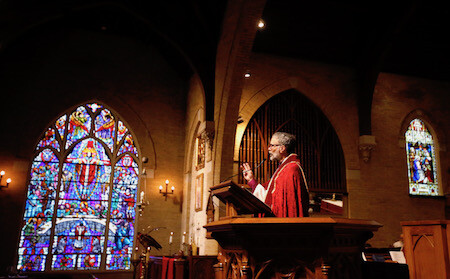How to Hear a Sermon Part II

- Learn from the oyster. By this I mean that a preacher will ask oneself – “what in this passage do I resist? What do I not want to hear?” Lean into that. So for the hearer too. Have I misunderstood? Or am I being challenged? That point of friction may be the grain of sand producing the pearl.
- Sermons are obviously but importantly inter- personal, embodied, human events of uttered communication. No duh! By this I mean a dying sinner, now redeemed, stands before and among you and tells something of urgent and personal importance. I am not saying that listening to sermons on YouTube is not valuable. But I am saying that an insert in the bulletin with all the same information is not the same thing. Sermons are “performance art.” In this way the sermon is irrevocably old-fashioned, even luddite - Amen!
- Pray for your preacher, listen hard, and encourage him or her, honestly. Preaching is not easy, and when the preacher struggles it is usually because really of spiritual discouragement. The spiritual writers called this “acedia” or spiritual depression. Are they listening? Does it make a difference? Who am I to speak? Isn't the church as it really is discouraging? These are the spiritual temptations of the preacher, who may, all too soon, lower what they expect of themselves in preparation, especially in light of the manifold pressures of the job. But preaching must be inextricably linked to suffering through those pressures, for there the preacher hears the Word addressed to him or her, and you overhear it.
- So long as the connection to the difference Christ makes is made, we profitably listen for the compelling image in the passage. The rope tying passage, theology, our experience, and today's world may be in a sense “visual.” The sermon is not a lecture. The preacher may help us see the point as a poet or a painter does. Listen for it and gaze on it.
- Here I admit I have a vested interest as your bishop - you need to be listening every Sunday! Preacher and listener have a relation of spiritual challenge and cooperation. Formation of the soul is over time, like a marriage or a deep friendship. There are dry patches and days when the clouds part. The latter depends on sticking with it, especially since readings in our tradition usually either work their way through books or track the life of Jesus in the calendar. Listening to sermons is a long-term spiritual friendship which comes to been seen as walking with another on the road to Emmaus. Turn off the road and you miss dinner.
- This is related to what Paul in Acts calls the “whole counsel of God.” We might compare this to hear a piece of polyphonic music. How the notes blend, the sound they make together is the heart of it. All preachers and listeners have themes they prefer, old standbys. But the lectionary is intended to make us here the sweep of the Bible story of salvation. Likewise, the listener must be attentive to soprano and bass, bright and dissonant. The goodness of creation, our deformity in sin, the centrality of Christ, life together in this in-between time, the great hope: we have to have ears for all the parts in the great harmony. The range of neither preacher nor hearer can be truncated. If it is, preaching becomes flattering words, winds of doctrine, self- help, or cultural commentary. But the real thing - hearing God Himself speaks good news through the struggling lips and ears of a room full of dying sinners, who are, it turns out, children of their Heavenly Father, is harder, and far better.
Salud
+GRS



